| Srl | Item |
| 1 |
ID:
142208
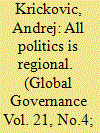

|
|
|
|
|
| Summary/Abstract |
Tip O'Neill famously claimed, “All politics is local.” As global governance falters and US leadership wanes, will “all politics” become regional with emerging powers (China, Russia, Brazil) taking responsibility for leadership at the regional level? While regional powers are providing effective leadership on free trade and financial stability, they have made much less progress on security issues where their approaches to certain problems, such as human security, diverge from those adopted by the West. Their ability to provide regional leadership is hampered by the increasing complexities of the modern world, including the conflicting dynamics of regionalism itself. The emergence of a centralized system of regional governance based on the hegemony of regional leaders is therefore unlikely. Instead, we are seeing the emergence of a complex and dynamic system of governance that includes a broad range of actors operating on multiple and overlapping levels.
|
|
|
|
|
|
|
|
|
|
|
|
|
|
|
|
| 2 |
ID:
142206
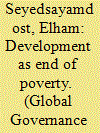

|
|
|
|
|
| Summary/Abstract |
This article examines the political processes that gave rise to the antipoverty norm—the normative principle that poverty is morally wrong and must be eradicated. It traces the origins of this norm to a critical juncture in the 1990s when the end of the Cold War ushered in a euphoric moment. Despite proclamations of the “end of history,” crises loomed large on the international stage where governance structures of an earlier era seemed like ancient relics no longer capable of managing problems of a new world order. As the World Bank and International Monetary Fund were attacked for conditionalities attached to their structural adjustment loans, the UN was overwhelmed with competing peacekeeping missions. Declining foreign aid and increasing conflicts relegated development to a lower rung of importance. As official development assistance fell, donor countries found themselves debating the future of development assistance and their role within it. Thus, international organizations created after World War II found themselves reflecting on their relevancy in a world that differed from the one that had given rise to them. In this moment of reflection, poverty was deployed as a strategic response to international institutions' varying crises of relevancy. In that process, instead of seriously critiquing and reforming extant global governance structures, the convergence of international institutions on poverty resulted in a reinvention of development orthodoxy while maintaining the status quo.
|
|
|
|
|
|
|
|
|
|
|
|
|
|
|
|
| 3 |
ID:
142209
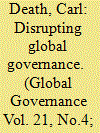

|
|
|
|
|
| Summary/Abstract |
Disruptive protest by nonstate actors often accompanies global governance conferences, but little analysis has been devoted to disaggregating its diverse forms. This article identifies four types of disruptive protest— symbolic, procedural, coercive, and evasive—and illustrates them with examples from UN environmental conferences in Stockholm (1972), Rio de Janeiro (1992), Johannesburg (2002), and Rio de Janeiro (2012). Symbolic disruption in Stockholm contributed to the production of new discourses; procedural disruption in Rio in 1992 introduced new actors and texts; some protestors sought to directly and coercively disrupt the summit in Johannesburg; and protests in Rio in 2012 illustrate disruption through evasion and exit. Understanding the form and power of such disruptive protests is crucial for studies of global governance.
|
|
|
|
|
|
|
|
|
|
|
|
|
|
|
|
| 4 |
ID:
142210


|
|
|
|
|
| Summary/Abstract |
Interest groups partake in transnational negotiation conferences en masse. This is surprising given that the chances for influencing policymaking at these venues appear to be slim while the costs of participation are high. This amounts to an interesting question: why do so many interest groups attend transnational conferences? This article aims to answer this question by offering the first systematic study of the activities of interest groups at transnational conferences. It analyzes the goals, strategies, interactions, and influence of various types of interest groups at two transnational conferences; namely, the World Trade Organization Ministerial Conference (2011) and the Conference of the Parties of the UN Framework Convention on Climate Change (2012). The data was collected through 349 interviews with interest group representatives and 129 interviews with government delegates who participated in these conferences.
|
|
|
|
|
|
|
|
|
|
|
|
|
|
|
|
| 5 |
ID:
142207
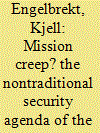

|
|
|
|
|
| Summary/Abstract |
In 2008–2011, the Group of 20 swiftly eclipsed the Group of 7, created in the mid-1970s as an informal mechanism for stabilizing markets and facilitating transnational currency exchange and investment. Several observers have expressed the view that the former, broader group is also destined to appropriate the role of the Group of 8, the G7's pioneering successor in the realm of nontraditional security. This article examines the G7/8 legacy of forging quasi-permanent institutional arrangements and frameworks in this policy area and goes on to gauge nontraditional security initiatives subsequently launched by the G-20. Having juxtaposed the past record of these bodies and analyzed the interests and power dynamics that influence member state action in the short and long term, the article outlines three basic options for how the relationship between the G-20 and the G7/8 may evolve.
|
|
|
|
|
|
|
|
|
|
|
|
|
|
|
|
| 6 |
ID:
142204
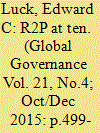

|
|
|
| 7 |
ID:
142205
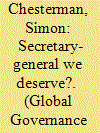

|
|
|